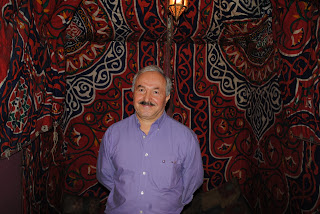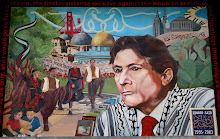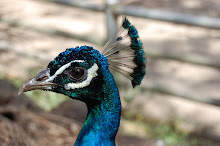
Sam Malak chomps on a piece of fresh green cabbage. His hands are busy chopping away at a mountain of onion with a massive cleaver. He chews on the cabbage with the same rhythm that he is chopping.
“Eh, what kind sandwich you want?” he says with a thick Arabic accent, still chewing on his cabbage.
“I’ll have Mary’s famous chicken salad sandwich,” says a customer.
Malak turns, puts down his cleaver and wipes his hand on his apron. “Mary!” he yells, “Chicken salad sandwich!”
Mary appears behind the deli counter and starts making her famous chicken sandwich. With her small frame she can hardly peer over the glass. All that is visible to the customer is her old hairnet bobbing around. She appears small and sweet, and then you hear her thunderous yell, “One chicken salad sandwich!”
One block away Joe Malak sits slumped over with crossed arms, patiently waiting for customers behind the check out counter of his corner market. He is going bald, wears a striped shirt and sports a salt and pepper mustache.
He meets and greets every customer as if they were family and his customers all know him by first name.
“Hey there, how are you doing today? Long time no see,” says Malak.
“Good, how’s the family, Joe?” asks one customer.
“Oh they’re great, have I showed you this?” Joe excitedly pulls out a copy of the San Mateo Daily Journal and the Menlo College campus newspaper, both sitting conveniently less than an arm’s reach away.
“That’s my son, he is very smart,” he says with a big grin while pointing to a photo in the newspaper of a young man giving a speech in a collared shirt and tie. “He’s on the cover!”
The customer nods nicely, pays for her groceries and leaves. Joe sits back on his stool, crosses his arms and waits for the next customer.
Joe and Sam Malak are just two of the thousands of Palestinians in San Francisco. They are also just two of the hundreds of Palestinians in San Francisco who work at a corner store.
There are over 300 corner liquor stores in San Francisco. In the Mission District of San Francisco, four out of five of them are run by Palestinian families.
Sam Malak, along with his brother Joe, own three corner stores, Guerrero Market and Deli, Golden Eagle Market, and 20th and Guerrero Market, all run by members of their family.
The Malak family came to the United States from Jordan 34 years ago. Their family moved from Palestine to Jordan when they were young, they still have a lot of family in both countries.
After the British Mandate ended in Palestine in 1948, the United Nations Partition Plan for Palestine divided Palestine into two separate territories, one being declared as the state of Israel, and the other smaller portion to become Palestine. Since then the area has been in a state of constant violence; the Zionists believe that the Jews have the right to the state of Israel, the Arabs believe that the Palestinians have the right to the land that was once theirs.
Since then, hundreds of thousands have tried to flee their homeland in search of stable living environment. According to the United States Consensus there were over 72,000 Palestinians in America in the year 2000, that number rose nearly 50 percent since 1990.
Sam and Joe, who go back to Palestine every two years to visit family, say the Palestinian community in San Francisco feels very much like home.
“There are a lot of us here, especially in this business, but there is no competition… We are all like brothers and we help each other out,” Sam says.
Sam has owned Guerrero Market and Deli for the past 10 years and tries to carry different varieties of beers and products than the nearby liquor stores, so he doesn’t take business away from them.
When Sam is not at his deli on 19th and Guerrero streets, he walks over to his 20th and Valencia store, where his customers also know him by name, to make sure everything is running smoothly.
Sam’s brother Joe has run their 20th and Guerrero location for the past four years. Joe’s wife Mary works with Sam at their deli a block away.
Joe can never turn down an opportunity to talk about his children. He proudly keeps a copy of the Menlo College campus newspaper with his son on the cover at his side at all times. His son Charles is going to San Diego State University to get his degree in sports medicine while his other son, Hanna, is the student body president and star athlete and Menlo College.
“They used to come help me out at the store, but now they are in college and they are so smart, they are very important boys,” says Joe with a wide grin.
Sam, who lives in San Bruno, and Joe, who lives in San Mateo with his wife Mary, commute to work at 9 a.m. and don’t leave for home until past midnight every day.

Sam says he got into the business by way of his brother-in-law, who told him he was opening a new shop and needed someone to run it. Since then, Sam has opened three of his own stores and gotten other family members into the business the same way he got started. His son John works at his 20th and Valencia Street location.






